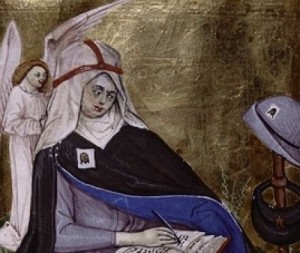All About St. Bridget
Today is the feast day of St. Bridget (1303?-1373), a woman who began having visions of Christ at the age of seven.
American Catholic says of her life:
From age seven on, Bridget had visions of Christ crucified. Her visions formed the basis for her activity — always with the emphasis on charity rather than spiritual favors.
She lived her married life in the court of the Swedish king Magnus II.
Mother of eight children (the second eldest was St. Catherine of Sweden), she lived the strict life of a penitent after her husband’s death.
Bridget constantly strove to exert her good influence over Magnus; while never fully reforming, he did give her land and buildings to found a monastery for men and women. This group eventually expanded into an Order known as the Bridgetines (still in existence).
In 1350, a year of jubilee, Bridget braved a plague-stricken Europe to make a pilgrimage to Rome. Although she never returned to Sweden, her years in Rome were far from happy, being hounded by debts and by opposition to her work against Church abuses.
A final pilgrimage to the Holy Land, marred by shipwreck and the death of her son, Charles, eventually led to her death in 1373. In 1999, she, Saints Catherine of Siena (April 29) and Teresa Benedicts of the Cross (Edith Stein, August 9) were named co-patronesses of Europe.
In honor of her feast day, here are three excerpts from the revelations given to her, which are still relevant to Christ’s followers today.
“Therefore, do not doubt that the good spirit of God is with you when you desire nothing but God and are completely inflamed by him! Only I can do this, and it is impossible for the devil to come near you then. He also cannot come near to any evil man unless I allow it, either because of his sins, or some secret judgment that is known only to me. For he is my creature like all other things — he was created good by me, but made himself evil by his own malice — therefore, I am Lord over him.”
“I am the Creator of all things — I, the King of Glory and the Lord of Angels! I built for myself a lovely castle and placed my chosen men in it, but my enemies undermined the foundation and overpowered my friends so much so that the marrow is violently forced out of my friends’ feet. … Now, however, this foundation is undermined because all believe and preach that I am merciful, but almost no one preaches or believes me to be a righteous judge. They view me as an unjust judge! Unjust and unrighteous, indeed, would the judge be who, out of mercy, allowed the unrighteous to go unpunished, so that they could oppress the righteous even more! But I am a righteous and merciful judge; for I do not let even the least sin go unpunished, nor the least good go unrewarded. By the undermining of this wall’s foundation, there entered into the Holy Church people who sin without fear, who deny that I am a righteous judge, and who torment my friends as severely as those who are placed in the stocks. My friends have no joy or consolation given to them but, instead, every kind of mockery and torment are inflicted upon them as if they were possessed by the devil. When they tell the truth about me, they are rejected and accused of lying.”
“For there are three states for humans in the world: The first state is that of those who fall into sin and get up again; these do I sometimes allow to suffer in their bodies so that they may be saved. The second state is that of those who would gladly live forever to be able to sin forever and who have all of their will and thought directed to the world, and if they do anything for me at any time, they do it with the intention of their worldly possessions growing and prospering. Neither punishment of the body nor very much pain of the heart is given to these people, but instead they are allowed to follow their own power and will, because they will receive a reward here for the least little good they have done for me to then be tormented for all eternity. For since their will to sin is everlasting, their torment shall also be everlasting. The third state is that of those who are more afraid of sinning against me and offending me than they fear any torment. They would rather endure to be tortured with unbearable pain in eternity than consciously provoke me to wrath. Sorrow of body and heart are given to these men, as with Peter and Paul and other saints, so that they may amend for all their sins in this world, or so that they may be chastised for a time for the sake of their greater glory and as an example to others. I have shown this threefold mercy to three persons in this kingdom whose names are well known to you.”
There are fifteen prayers attributed to St. Bridget, and the first begins:
Eternal Sweetness to those who love Thee, joy surpassing all joy and all desire, Salvation and Hope of all sinners, Who hast proved that Thou hast no greater desire than to be among men, even assuming human nature at the fullness of time for the love of men, recall all the sufferings Thou hast endured from the instant of Thy conception, and especially during Thy Passion, as it was decreed and ordained from all eternity in the Divine plan.
Today, we remember the life of a woman of Christ, a woman who is remembered as co-patroness of Europe for her lifetime of unwavering faith.








